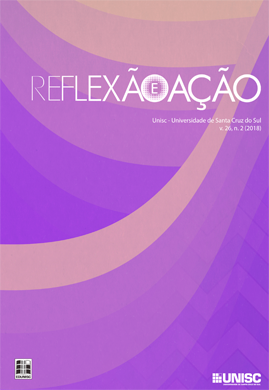POETRY: STRATEGIES FOR EXPERIMENTING AND TAKING BLISS AT THE CLASSROOM
DOI:
https://doi.org/10.17058/rea.v26i2.11601Keywords:
Poetry, Strategies, Bliss, Authorship.Abstract
Poetry is intrinsic to man. In its historical origin, the term “poetry” proceeds from the Greek word poiein, which means “to make”. Since an early age, children manifest fascination for language games and its sonic and rhythmical dimension. The earlier boys and girls meet and interact with this form of language, the higher their level of familiarity and the possibilities of establishing a pleasant, fertile relationship between them. The role of the school consists in promoting and potentiating the poetry-and-child encounter. This text aims, largely, to increase reflection on the presence of poetry in school and, specifically, to start a dialogue about the strategies that allow to experiment and take bliss in poetry on the floor of the classroom, beginning with an interlocution with different researchers on this theme. This study also goes to school, in the Portuguese context, to establish a dialogue with the teachers of the early years of primary school about: how to insert poetry into this space-time; how often poetic texts transit through the classroom; and, especially, how to get those mediators to share their real work experiences with poetic texts. We stress the significance of the strategies of work with poetic texts being present in the early and later stages of teachers’ training. Our reflections point to a propositional direction, seeking to emphasize strategies that enable the students to experiment, take bliss, and create poetry on the floor of the classroom and whose empiric treatment takes into account the aesthetic, linguistic, and literary aspects consubstantiate such language form.Downloads
Downloads
Published
How to Cite
Issue
Section
License
The submission of originals to this journal implies on the transference, by the author(s), of the printed and digital publishing rights. The author´s rights to the published articles are the author´s, the journal has the rights over the first publication. The author(s) can only use the same results in other publications, indicating clearly that this journal was the original publisher. Since we are an open access journal, the free use of articles is permitted for educational and scientific applications, as long as they inform the source according with the CC-BY license from Creative Commons.


